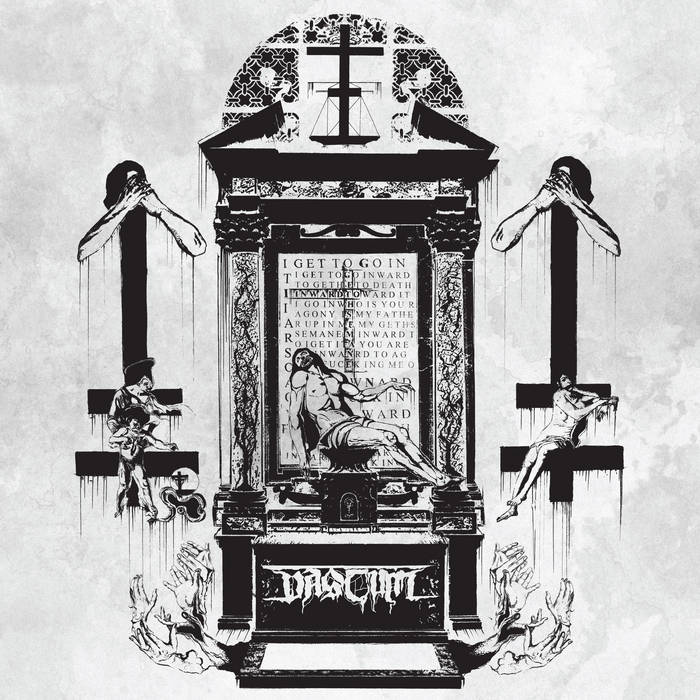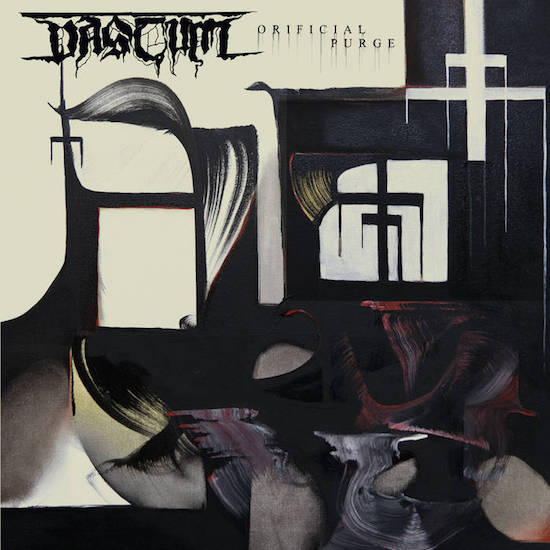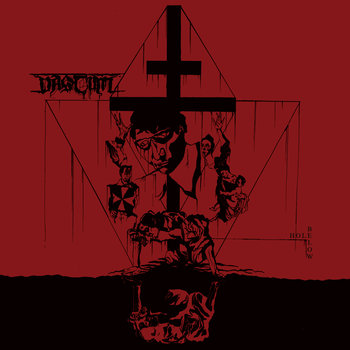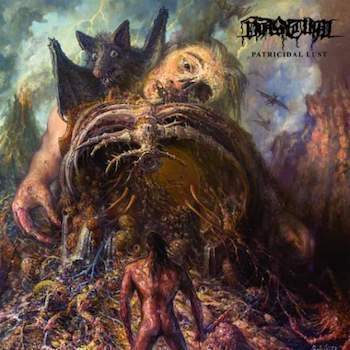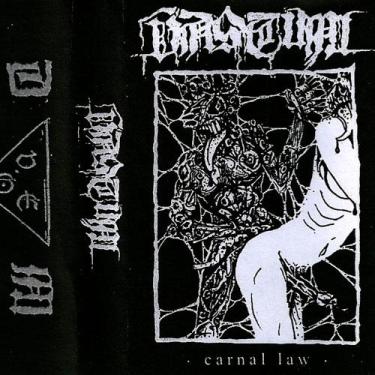Vastum - Interview
Vastum's latest work is a death metal masterpiece touching many areas of the psyche. Fantasies and mysteries alike take province within the band's music that seems to always outdo prior efforts. "Orificial Purge" is their 4th full length record that once you've heard it, you'll be unable to put it down. Six songs of muscle and monstrosity make way to the headbanging beholder; though veiled to an extent through its lyrics, the tonality lifts the covering to reveal the horror ever frequently. As vast as the band's collective image may be, "Orificial Purge" is but a new revelation of the landscape. MetalBite was lucky enough to catch up with Daniel and Leila to give some insight about "Orificial Purge".
Alex
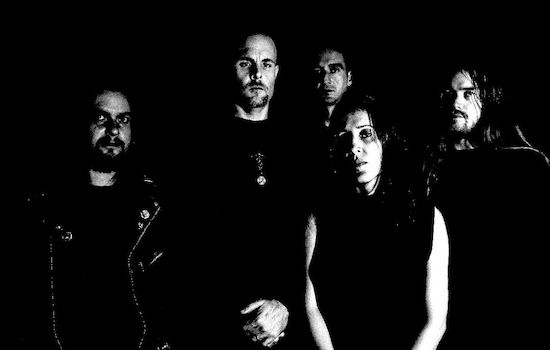
Thank you for granting MetalBite the time to conduct this interview. Also, congratulations on the new entry into Vastum's catalog; How has touring been? Are there any upcoming shows planned in support of "Orificial Purge"?
L: What little touring we've done has always been a positive experience and hope to do some more in 2020. Our next show is at Shadow Frost Fest in Maryland, Feb 21-23.
How did the band meet and form?
L: I met Dan first, around 2007, when Acephalix was just getting started and met Kyle and Luca shortly after that. Dan and Kyle go pretty far back, I think. I introduced Dan to RD sometime in 2009; RD used to play drums in Infest and I think is still playing in (The Infamous) Gehenna. Dan, RD and Kyle formed Corpus and recorded a demo; it was a deathpunk kind of thing. A month or so after recording the demo, and right after my old band Saros broke up, Kyle asked if I wanted to play second guitar. So I jammed with them, and started writing new songs with Kyle, which changed the direction of the band to a darker, doomier and slightly more technical sound (very slightly!). The new direction warranted a name change, so I came up with Vastum. Luca joined on bass shortly after the name change.
How did you arrive at the name Vastum?
L: Coming up with a band name is never easy. I came across Vastum in a Latin glossary, and the meaning of it (waste, empty or vast) felt like it captured the essence of our lyrics and what we're about as a band.
Vastum's style of death metal is sexually corrupt with all kinds of depraved and grotesque imagery and lyrical content. How did this idea of blending pleasure, pain and wickedness come to fruition?
L: Extreme music warrants extreme lyrics. But life is also extreme. We delve deeply within ourselves and our experiences, thoughts, fantasies, nightmares and the lyrics and images you read and see are the result of this process.
D: I'm interested in the psyche as a source of horror, and I'm interested in how there can be something religious and erotic in the horror that the psyche begets. This approach is related to intellectual interests, but it's also related to a certain kind of emotional orientation to the world. I think I've always been drawn to complex internal experiences, especially those of a darker sort, so that's what you get in our lyrics.
Was it difficult to acquire members to play in the band?, And more-so, finding members that share similar musical philosophies and subject interests.
L: Not at all. It came together naturally and easily, more so than for any band I've been a part of. We never seem to struggle finding new members when needed, and I'm grateful for the many people who have offered to play in the band. The Bay Area is a good place to be if you're looking for death metal musicians.
To me Vastum is like an underground death metal super-group, all members are associated in other notable acts, thus how do you balance and find time to commit to this project?
L: It's our biggest challenge, to carve out time to write, record and play shows, because of all of our collective commitments to other projects. It can be a crazy and hair pulling thing! Everyone is experienced and talented enough to pull it off in the little amount of time we have, and we do the best we can.
I have listened to your new record "Orificial Purge" and I'm impressed at the level of detail you were able to place into 6 songs; was the writing and recording process for this tedious or prove to be more difficult than in the past?
L: Thank you! It's always hard to try to outdo ourselves with each new release. Shelby, Chad and I spent a lot of time preparing for recording and demoed the tracks before we went into the studio, which we hadn't done as much previously to this extent. We also didn't have a lot of time booked in the studio, so we had to utilize the time wisely. I tend to write in bursts; I won't have any ideas for a long time, but once I get started, I can get half of an album's worth in a relatively short period of time.
Who makes the final decision as to whether a record is complete and fit for release?
L: We all do, to varying degrees. All of us took part in the mixing process for "Orifical Purge".
How do you work around musical disagreements within the band, if any?
L: I think one of our collective strengths is that we are able to solve disagreements in a civilized way where at least everyone's voice is heard, even if not everyone's preferences are incorporated 100% of the time. Sometimes compromise is necessary.
There is a magic between Daniel and Leila often times created through the vocal toggle, like a dangerous affair occurring between domination and fragility. Was it a conscious decision to have 2 vocalists as a means to evince an atmosphere of oppression submission?
L: Dan and I are both quite dominating vocally - unbeknownst to many, because I don't sound stereotypically female - but we work together very collaboratively. We knew from the beginning we would both be doing vocals and were mutual fans of our previous vocal work.
D: I'd been a fan of Leila as a vocalist and guitarist for some time prior to forming Vastum. I wanted to play in a band with her, and I'm pretty sure I'm the one who really pushed for it (I first introduced myself to her at a restaurant where I was waiting tables; she was eating with a former collaborator, Eric Wood of Man is the Bastard). I wanted both of us to sing, so yeah, it was a conscious decision. I think our vocal dynamics have grown over the years, and that they're more interesting and complex on this record than any other.
Adding to that is your provocative song titles and lyrics such as 'I on the Knife', I might be wrong, but that sounds like a less venereal way of indicating penetration. Am I correct? Please elaborate even if I've been misled into a false interpretation.
D: 'I on the Knife' is a weird song. I wrote most of it in one sitting. It's about dissociative states or moments when we're commanded by another, a figure outside the self, and how this figure's command constitutes the self and so isn't technically outside of it at all. Like a lot of the songs on this record, I'm bridging the violence of mysticism, eroticism, and dissociation to tell something like demiurgic myths. The dissociative commands come from a God-like figure who instructs a subject to mutilate themselves - or who instructs the subject to keep their 'I'/'eye' on the knife - and it's through the subject's self-mutilation that a new world is born (creation ex-nihilio). The self-mutilation is a kind of deicidal gnosis, by which I mean the subject mutilates the divinized knower (the 'I' as a God), and it's through this (pleasurable) self-mutilation that the unknowable - a new self/world, one born of blood and a time beyond time - comes into being.
I have also noticed each of your full-length records contain 6 tracks, what is the meaning behind this? Is it some reference to occultism in sex (6ex) or is it mere coincidence or other?
L: I don't think this was ever consciously intentional. However, I think the 6-track format works very well for Vastum, both for the sonic experience and the logistics of releasing vinyl.
Moral boundaries are crossed in your music, particularly where the ideology behind love is concerned, hence it appears you must be fans of Friedrich Nietzsche's work or at least inspired by it. Would you share some insight here?
L: I discovered Nietzsche's writings when I was 14 years old, and although I haven't delved too deeply since, I wouldn't say it's wrong his work has affected me on a subconscious level at least.
D: I'm not totally sure what you mean, but I'll try to roll with the question. I'd say we're quite Nietzschean, largely via Bataille. Nietzschean ethics go beyond good and evil, which is what makes them radically evil. For Pseudo-Dionysus, what's radically evil is not opposed to the good; rather, the radically evil is opposed to production - it is that which is useless and so cannot produce any kind of 'good' at all. Nietzsche espouses a similar view. If Nietszchean vitality opposes the production of goods, which in turn opposes a certain relationship to time in which the goodness of my life in the present is dependent on the goods that I produce in the future (slave morality), then its reverence for momentous vitality is a form of radical evil. How does this relate to love? The love of life is an indifference to the production of goods; it's a form of radical evil in that it's an immersion in the moment. This love is not about persons or respect for personhood; it's about something more like libido and a celebration of (a potentially violent) vitality that transcends the person to more deeply commune with the world.
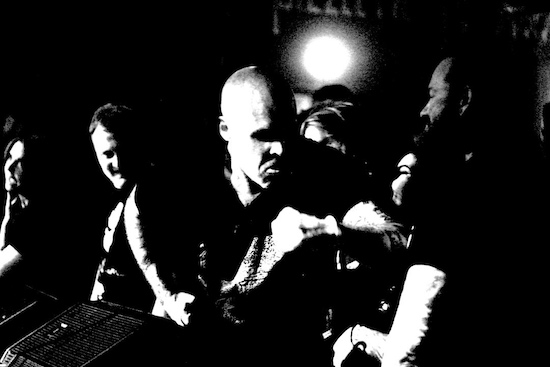
Would you agree the traditional concept of love is all systematically fabricated to veil the truth behind physical attraction, fetishes and social preferences?
D: Love is what sexuality struggles with and against, so I don't think the two can exist separately, nor do I think one veils the other. The veil is a doubling in which both conceal and reveal the other to create an ineradicable antagonism.
Would you say the term was constructed to suppress innate survival instincts and necessities of man?
D: I wouldn't actually. I think love or attachment is about survival, whereas sexuality is about destruction.
Is Vastum's music a take on true human nature to some degree?
D: I don't know about human nature, but we're definitely drawn to some diagnosis of the human condition.
Does it attempt to exhibit what is considered as 'foul' to be very much associated with the idea of affection?
D: I think we cherish the things we call foul but repress or dissociate that cherishment.
Are the philosophies represented through Vastum's music a reflection of any personal experiences?
D: Yes and no. I wouldn't say they're autobiographical. I don't like the idea of autobiography. It assumes too much conscious control of a narrative. Our lyrics aren't confessional in any way. They're about psychic life, which exists at the border of reality and fantasy.
How much of a role does each member have within Vastum? Is it an autocratic band or is it open to internal constructive criticism?
L: We are not autocratic, but not entirely democratic either. Everyone in this band does have a voice and everyone is heard but sometimes compromises are necessary to be able to move forward with our business.
An obscene spiritual intimacy also materializes through your work; would you agree or disagree that there is an ethereal element present within Vastum's music and particularly on "Orificial Purge"?
D: Definitely. That element is supposed to evoke something of the connection between violence, spiritual or religious experience, eroticism, etc. It's always been there, but I might be more pronounced on this record.
The artwork on "Orificial Purge" appears to be an extension of that on "Hole Below". Hence I suppose its contents are a further step taken in advancing "Hole Below"?
D: Laina Terpstra's painting is her response to Vastum. It's a response to her experience of meditating on our aesthetic and vision, which connects to her own in various ways.
I enjoy the way you play with words, whereby a blur of sorts between pleasure and hostility manifests. Please elaborate on this.
D: I suppose that reflects my/our insistence on violence as a part of life, or as something that transcends morality and form. I'm trying to link the physical and the psychical, the mystical and the erotic, whenever I can. It's an impossible link - such phenomena are ultimately irreducible to each other - but I feel a responsibility to try to make it anyway.
Do you think "Orificial Purge" speaks to the inner urges oftentimes hidden behind societal restraints? As though we are all vulnerable to succumbing to our temptations.
D: Prohibition reveals transgression as much as it tries to conceal it. I don't think people are very restrained actually - just look around.
Last time I checked "Patricidal Lust" was out of print, are there any plans to reissue the record?
L: 20 Buck Spin plans to reissue "Patricidal Lust" in 2020.
Excellent work on "Orificial Purge", I look forward to getting it on vinyl. Thank you for taking the time-out in contributing to this interview. MetalBite wishes Vastum all the best in future musical endeavors of introspect and provocation. Is there anything Vastum would like to add in closing?
L: Thank you, and thanks for the interview.
D: Thank you for the very thoughtful questions.
Discography
Upcoming Releases
- Morrath - Obscure Abominations - Feb 25
- Chalice - Divine Spear - Feb 27
- Blackwater Drowning - Obscure Sorrows - Feb 27
- Vide - Aux Enfants Des Ruines - Feb 27
- The Leaving - The Leaving - Mar 06
- Serpent Icon - Tombstone Stories - Mar 06
- Insect Inside - Reborn In Blight - Mar 06
- Triumpher - Piercing The Heart Of The World - Mar 06
- Lömsk - Act II - Of Iron And Blood - Mar 06
- Monstrosity - Screams From Beneath The Surface - Mar 13
- Against I - Anti Life - Mar 13
- Empire Of Disease - While Everything Collapses - Mar 19
- Putred - Blestemul Din Adânc - Mar 20
- Gaerea - Loss - Mar 20
- Diatribes - Degenerate - Mar 20
- Zerre - Rotting On A Golden Throne - Mar 27
- Foetorem - Incongruous Forms Of Evergrowing Rot - Mar 27
- Cryptworm - Infectious Pathological Waste - Mar 27
- Antrisch - Expedition III: Renitenzpfad - Mar 27
- Cruel Force - Haneda - Mar 27

